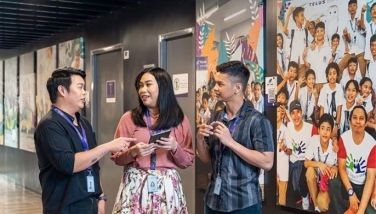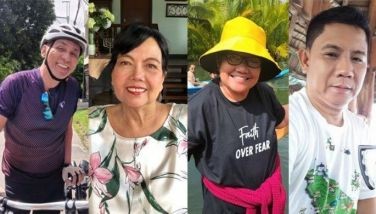Senior citizen survivors

Medical care for the elderly has become one of the biggest challenges during the pandemic, more so for those who have relatively serious health issues or who had been deprived of a means to earn.
These days, for those who have survived what seems to be the worst upsurge of this life-threatening virus, living day to day continues to be tinged with caution and an abundance of precaution. It is still toughest for those most vulnerable to COVID-19 who continue to sacrifice their ability to socially interact with others and who look forward to that day when health authorities declare the end of this pandemic.
For senior citizens who have survived till now, vaccines have proven to be an effective protective armor, and as they slowly resume activities like travel and face-to-face meetings with family and friends, some of the more basic health protocols when in public spaces remain: face masks, sanitizers, and social distancing.
Vaccines, in essence, prevent the coronavirus from attacking the vulnerable parts of your respiratory system, but can still leave one weak from severe flu-like symptoms. And for the vaccinated elderly who are immunocompromised, catching the bug can push healing to an inordinately long time and at great expense.
Pandemic worries
In a rapid needs assessment conducted in late May 2020 by The Coalition of Services of the Elderly (COSE), with HelpAge International, anxiety was a key concern by close to 80 percent of respondents interviewed. Their apprehensions stemmed from the lockdowns that prevented them from leaving their homes, affecting their sources of livelihood and access to food and healthcare.
In many of succeeding studies and surveys conducted by various other groups, the collated needs of senior citizens highlighted during the pandemic serve as guidelines in improving their lot and helping them cope with the more intense challenges of a post-pandemic world.
The Philippines has about 10 million senior citizens, half of who live below the poverty line. Thankfully, majority of them survived affliction and death, the latter of which hit hardest individuals who had comorbidities regardless of age. Contextually, the Department of Health recorded some 60,000 deaths due to COVID-19 to date.
For senior citizens who belong to the less privileged sector, mainly those who rely on that meager state support to get them through weeks and months, food has become the major need, especially after being deprived of the right to work.
Many seniors, in fact during the first six months when quarantines were in place in 2020, expressed resentment about the government lockdowns affected their ability to earn, which was already impaired even before the pandemic struck. While the Bayanihan to Heal as One Act appropriated from P5,000 to P8,000 for senior citizens belonging to the most vulnerable sectors, this one time cash dole-out barely compensated for lost incomes, thus forcing many to consider eating less as a solution for survival.
High medical costs
Today, more than two years after the state of pandemic was declared, seniors who are reassessing their prospects for the remainder of their life are finding them discomfortingly unhinged from pursuing decent normal living. Many have lost a sizeable amount of wealth, and a larger number fear not just hunger, but also the inability to provide for their medical needs.
Even for senior citizens who receive pensions from employment during their younger years, the cost of medicines and hospitalization should any health emergencies arise may likely necessitate dipping into their savings if any.
The situation understandably is worse for indigent seniors who draw most of their health support through various laws and orders created in recent years. Realistically, the mandated coverage of senior citizens under the national health insurance program does not assure adequate healthcare delivery.
If our lawmakers seriously want to consider maximizing government help for our aged citizens, improving medical support for them should be a priority, next to increasing the monthly social pensions from either the state’s cash dole-out system or for those who had been employed in the private sector.
Monthly pensions
The monthly P500 stipend dispensed by the Department of Social Welfare and Development through the social citizens’ local government offices definitely needs to be raised, but more importantly, to reach every deserving recipient. Many studies have reflected leakages in the program that could be resolved through a thorough adoption of an accurate senior citizens’ database.
On the other hand, the monthly amounts received by pensioners of the Social Security System (SSS) definitely are not enough to support the lifestyles that retired employees deserve after diligently contributing part of their salaries during about two-thirds of their working life.
A retirement model to consider could be that of government employees through the Government Service Insurance System (GSIS), which requires a minimum monthly contribution of P5,000 from the employee and a higher counterpart from the government. SSS employees pay less than P1,000 while employers shell out a little higher. Their contrasting level of contributions certainly reflects the big difference in pension payouts.
The Philippine population is expected to reach 142 million by 2045, and by that year, the number of senior citizens will comprise about 16 percent or more than 22 million if the population.
Setting the right direction for their retirement needs is one of the key concerns that the incoming administration should work on to avoid problems from escalating beyond reasonable levels.
Ageism, which other developing countries are now confronted with, should not be a burden as the country shifts its growth goals to becoming an upper middle-income economy.
Facebook and Twitter
We are actively using two social networking websites to reach out more often and even interact with and engage our readers, friends and colleagues in the various areas of interest that I tackle in my column. Please like us on www.facebook.com/ReyGamboa and follow us on www.twitter.com/ReyGamboa.
Should you wish to share any insights, write me at Link Edge, 25th Floor, 139 Corporate Center, Valero Street, Salcedo Village, 1227 Makati City. Or e-mail me at [email protected]. For a compilation of previous articles, visit www.BizlinksPhilippines.net.
- Latest
- Trending




























